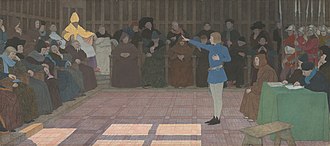Saint Joan of Arc (Jeanne la Pucelle)
Saint Joan of Arc called herself, Jeanne la Pucelle, meaning "Jean the Maid." Also known as "Joan of Orleans," for her miraculous intervention in the One Hundred Years War, the turning point of which was the "Siege of Orleans," ended by Joan's brilliant military command.

** page under construction **
The prophecies of Joan of Arc
Liberating Orleans
Freeing the Duke of Orleans
The Crowning of Charles VII
The end of the Hundred Years War
Historical sources
Recollections of Joan of Arc by Mark Twain
Few people know that Twain wrote about Joan of Arc. There is a story that as a child he encountered a stray page with the story of her trial, and the young Samuel Clemens took great offense at her interrogators. Whether true or not, he became fascinated by her story and yearned to tell it:
I like Joan of Arc best of all my books; and it is the best; I know it perfectly well. And besides, it furnished me seven times the pleasure afforded me by any of the others; twelve years of preparation, and two years of writing. The others needed no preparation and got none.[1]
Modern academics who study Twain consider it unworthy of his canon.[2] They can't deny that he thought it was his greatest work, and also that it contains classic Twain wit, but they just can't stand that he was "infatuated"
Those critics complain that in writing the book, Twain succumbed to Catholicism. I have no words to express how stupid that is. It's got to be their animosity for Christianity in general, and for Catholicism in particular, when expressed as profoundly by Saint Joan.
A final note: Twain wrote the book before Joan was canonized, thus "Saint Joan" does not appear in the work. Twain does describe her as a saint:
She was not solely a saint, an angel, she was a clay-made girl also — as human a girl as any in the world, and full of a human girl's sensitivenesses and tendernesses and delicacies.[3]
Saint Joan by George Bernard Shaw
Not much to say about this one. Shaw was early in adulthood an atheist and seems to have wanted into Deism and perhaps belief if not in Christ but in Jesus. The play is considered one of Shaw's greatest works, and it has been repeated on stage through the 2000s and in film. Shaw wrote it after Joan's canonization, thus the title. But he wasn't celebrating it. He rather sadly tried to humanize Saint Joan, whom he said was overly-romanticized and her accusers villainized. He presents her as a rebel against authority, along the lines of his ubermensch female character in Man and Superman. Shaw presents her tormenters as motivated by the facts and situations before them, and thus, heh, it's all just a matter of perspective.
Enough of that.
Jeanne D'Arc (1895) by Louis-Maurice Boutet de Monvel
In 1896, Louis-Maurice Boutet de Monvel illustrated a children's book of the life of Joan of Arc. Through the early 1900s, he expanded several of the images into full paintings, a collection of which are held by the National Gallery of Art in Washington DC, per here:
-
La Vision (Vision of the Archangel St. Michael)
-
Appeal to the Dauphin (the Dauphin had someone else sit on the throne and hid amidst the Court; Joan identified him immediately)
-
The Maid in Armor on Horseback (now Commander of the French Armies, Joan marches the army to free Orleans from the English siege)
-
The Turmoil of Conflict (the Battle of Orleans, which is nearly lost after Joan is hit in the shoulder and neck by a bolt, but she returns to the field and leads the French to victory)
-
The Crowning at Rheims of the Dauphin (Joan's mission was to have the Dauphin properly crowned King by French custom and in the form of Charlemagne; the leadership thought it was unnecessary, but Joan understood that the people of France needed the ceremony)
-
The Trial of Joan of Arc (The King and his councilors betray Joan, leaving her to fight with a small army; she is captured by the French ally of the English. The French King refuses to pay a ransom for her, and she is tried in an illegitimate ecclesiastic court)
- ↑ Personal Recollections of Joan of Arc - Wikipedia No source is given for the quotation, but it is undoubtedly Twain's words.
- ↑ See Personal Recollections of Joan of Arc - Wikipedia
- ↑ citation to do >> p. 369 of 1901 edition (not in Harpers)
Sources
see






